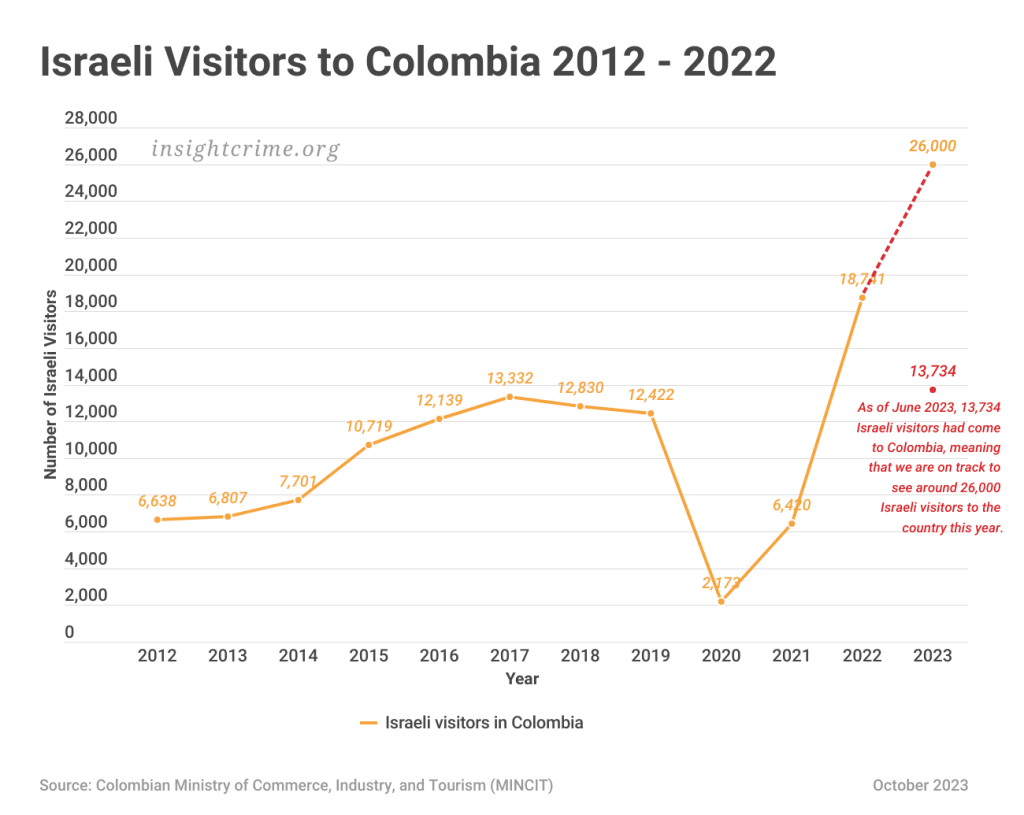This article is part of NarcoFiles: The New Criminal Order, a transnational journalistic investigation into global organized crime, its innovations, its tentacles, and those who fight it. The project, led by the Organized Crime and Corruption Reporting Project (OCCRP) in partnership with Centro Latinoamericano de Investigación Periodística (CLIP), began with a leak of emails from the Colombian Prosecutor’s Office that was shared with InSight Crime and more than 40 media outlets around the world. Reporters examined and corroborated the materials along with hundreds of other documents, databases and interviews. Read the rest of the articles in this series here.
Israeli crime groups in major Colombian cities have been serving a growing market of tourists seeking sex and drugs, at times expanding into transnational trafficking and alarming authorities in both countries, according to hacked records from Colombia’s Attorney General’s Office.
The hacked files, most of which are from 2018 to 2022, include phone tap records, arrest and seizure reports, and correspondence between Israeli and Colombian officials, who exchanged information and expressed growing concern about Israeli gangs’ operations in Colombia.
“We have identified a significant increase in Israeli citizens living in Colombia, who, under the leadership and with the complicity of Colombian citizens, are carrying out a variety of crimes on Colombian territory,” reads an unsigned memorandum of understanding between Colombia’s Attorney General’s Office and Israel’s National Police, dated May 3, 2018.
The files suggest Colombian and Israeli authorities maintained a close anti-crime relationship in the years following the exchange of the memorandum of understanding, though it is unclear whether the document was ever signed. Israeli officials did not respond to requests for comment, and Colombia’s Attorney General’s Office declined to comment on the document.
Israeli gangs in Colombia largely serve tourist markets and operate primarily in big cities. While most of the gangs have limited or no ties to major players in Colombian organized crime, the files provide evidence of occasional high-level cooperation for transnational cocaine trafficking.
The files, combined with additional investigation by InSight Crime, give a glimpse into the little-studied phenomenon of Israeli organized crime in Colombia. They also provide a first-hand account of the daily workings of the long-standing relationship between the Israeli and Colombian security establishments before recent tensions between the two countries ruptured a traditionally cooperative anti-crime partnership.
Criminal Economies Focused on Tourists
Israeli retail drug trafficking and human trafficking operations are relatively small compared to more established networks in Colombia, but the Israeli groups serve an expanding niche market in the form of Israeli backpackers.
The number of Israeli backpackers arriving in Colombia grew steadily in the 2010s and sharply in recent years. In 2021, 6,420 Israelis visited Colombia, in 2022, that number grew to 18,741, and 2023 is on track to beat that record, with 13,734 Israelis having visited Colombia as of June.


Backpacking trips abroad are common among young Israelis following mandatory military service, according to academic research that links these trips to increased participation in drug use and risky sexual behaviors.
“As a rite of passage, these trips are a way to disconnect from societal demands, and they represent a challenge to established values and norms,” according to an article published in the Israel Journal of Health Policy Research.
: Children, Sex and Gangs in Medellin
Israeli crime groups in Colombia cater to the appetites of the backpackers. Of the four Israeli networks that appear in the hacked files, three were involved in retail drug trafficking, two of which were also engaged in the sexual exploitation of minors and related money laundering activities in tourist centers.
One such network was led by Assi Ben Moosh and his associates, who allegedly set up extensive human and drug trafficking networks in Santa Marta, Medellín, Cartagena, and Bogotá, catering to foreigners, especially ex-military Israelis.
After authorities deported Ben Moosh, his associates continued to run these operations, organizing parties in villas in and around Medellín to sell drugs, according to the hacked files.
InSight Crime attempted to contact Ben Moosh through his lawyers in Israel but did not receive a response by the time of publication.
Two other criminal networks, whose practices were similar to Ben Moosh’s, appear from the hacked documents to have operated at least into the fall of 2021.
Colombian Partners in Transnational Drug Trafficking
Israelis, like other foreign brokers, are also moving upstream in the cocaine supply chain to take advantage of strong local demand and Europe’s booming consumer drug market.
Both Israel’s consumer market for cocaine and its role as a transport nation in the pipeline to Europe appear to be growing, according to a 2023 report from the United Nations Office on Drugs and Crime (UNODC).
Cocaine seizures in Israel began to climb in 2018, and in 2020 the country seized more cocaine than any other in the Middle East. It also had the region’s second-highest rate of treatment for cocaine misuse, suggesting a robust domestic consumer market.


Israel remains a relatively minor cocaine transit country. It has yet to seize more than a ton of the drug in a year.
But Israel’s reputation as what the UNODC calls a “far-flung or unusual” point of transit, as well as its developed transport infrastructure, may be attractive to traffickers looking for alternative transit routes into Europe, whose major ports are under increasing anti-drug scrutiny.
Authorities tracked at least two Israeli-Colombian networks involved in transnational drug trafficking from Colombia to Europe and Israel, according to the hacked files.
One was run by a trafficker named Pedro Silgado. Nearly 12 months of transcripts make it clear that Silgado was running a Colombian cocaine transport network from within La Picotá prison in Bogotá, answering to Israeli financiers. The network shipped liquid cocaine from Cartegena to Israel.
Similar partnerships have been reported by Israeli media. But Silgado’s Israeli financiers were eager to come to Colombia, the phone tap records show, suggesting they intended to establish a stronger presence further upstream on the cocaine supply chain.
Silgado died of cancer in 2020. Attempts to contact his lawyer were unsuccessful.
: US Blacklists Colombia Money Launderers with Israel Connections
Israeli authorities also flagged another transnational network led by Israeli nationals. The network allegedly sold drugs imported from Israel while at the same time sending shipments in the other direction to Europe and Israel.
Close Bilateral Ties
Israel and Colombia’s security relationship stretches back decades to when Colombian armed forces began purchasing weapons from Israel in the 1980s.
The partnership strengthened considerably in the 2010s when Israel’s Prime Minister Benjamin Netanyahu visited Colombia for the first time, and Israeli soldiers trained Colombian counterparts to fight the country’s largest non-state armed actor, the Revolutionary Armed Forces of Colombia (Fuerzas Armadas Revolucionarias de Colombia – FARC).
: Argentina Militarizing Fight Against Crime With Help from US, Israel
In the last half-decade, particularly since the FARC officially demobilized under the terms of a 2016 peace deal, the two nations’ security relationship evolved from focusing on guerrillas to targeting transnational drug trafficking brokers.


The May 2018 memorandum of understanding outlines plans to create a special unit composed of Colombian judicial police to investigate Israeli criminal networks present in Colombia or working with Colombian criminal networks.
The memo also stipulated the creation of a new database and systems of early warnings, information sharing, and cooperation when it came to Israeli networks operating in Colombia or working in coordination with Colombian organized crime.
Correspondence between Colombian and Israeli officials contained in the files suggests a close working relationship under former President Iván Duque, who served from 2018 to 2022. But Duque’s successor, Gustavo Petro, has been a staunch critic of Israel for years.
In October, Petro floated the possibility of cutting diplomatic ties with Israel over allegations it violated international law in retaliating against a deadly terrorist attack by the Palestinian military group Hamas. Israel responded to Petro’s comments by suspending military exports to Colombia.
In the weeks that followed, diplomatic tensions have persisted, though experts told InSight Crime that a permanent rupture is unlikely.
“I believe that it is not in the interest of either Israel or Colombia to ruin their relationship, neither in defense, nor in other commercial areas,” Sergio Guzmán, a political risk analyst in Bogotá, told InSight Crime.
Although it remains unclear where this leaves the two sides’ intelligence-sharing agreement, experts say any damage can be repaired.
“In the worst-case scenario, bilateral relations between Tel Aviv and Bogotá could be tense until Colombia has elections, and a new president comes into power,” Wilder Alejandro Sánchez, president of Second Floor Strategies, a geopolitics and security consultancy, told InSight Crime.

